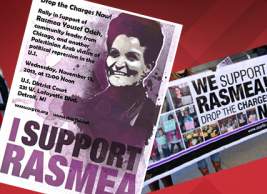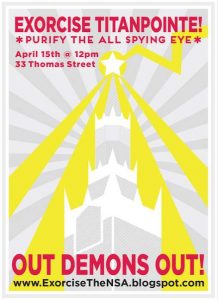Podcast: Play in new window | Download
Trial Judge Rules Against 69 Year Old Palestinian Activist Rasmea Odeh
In 1969, when she was a 21 year old college student in Ramallah in the Israeli occupied territories on the West Bank, Rasmea Odeh, a Palestinian woman, was arrested for killing two Israeli University students with a bomb placed in a supermarket. She confessed to the crime and served 10 years in prison, getting out in a prisoner swap. She came to United States 20 years ago, obtained citizenship, and settled in Chicago as a community organizer of immigrant Arab women. Odeh was criminally charged two years ago by the federal government with “unlawful procurement of naturalization.” In her application, she omitted mention of the crime for which she was convicted in Israel. In her defense, she said that she could not remember, that she had post traumatic stress disorder as a result of being tortured in jail for 25 days and forced to sign a false confession. Her expert witness was not allowed to testify as to the PSTD and the torture. The trial judge’s ruling on this was overturned by a Federal Court of Appeals. Last week she agreed to a plea arrangement where she would be stripped of her citizenship and deported rather than face a 5 to 7 year prison sentence and indefinite detention by ICE. She is 69 years old and does not know where she will be sent inasmuch as she cannot go home.
Guest – Attorney Michael Deutsch had represented Rasmea Odeh. He is a partner at the Peoples Law Office in Chicago and a former legal director at the Center for Constitutional Rights. After clerking for United States Court of Appeals Judge Otto Kerner, Mr. Deutsch went into private practice, joining People’s Law Office in 1970 where he has represented political activists and victims of police and government civil rights violations. His advocacy has taken him all around the world, including to hearings in the United Nations. He has tried many civil and criminal cases in federal and state courts, and has written and argued numerous appeals, including several in the United States Supreme Court.
—-
New York City Titanpointe National Security Agency Protest
There is a massive 550 foot tall gray granite and cement NSA spying hub hidden in plain sight in a windowless skyscraper in downtown Manhattan. At noon on April 15 an action is planned by a group called the Quiet American. It is an arts and politics journal based in Ridgewood, Queens, New York. They will perform a rite of exorcism on the building in order to, as their press release states, “to metaphysically purge the edifice of the data it hoards and to invoke a less maniacal version of citizen-government relations.”
The building is located at 33 Thomas Street where the action will take place. It is a windowless monolith that people say is “creepy as hell” and “a monument to the bottomless fear that locks us in permanent war”. The building was designed to withstand a nuclear assault and sustain its employees working there for two weeks.
Guest – Eli Smith, a musician and activist from Brooklyn, who has helped organize the event. Eli Smith is also a folklorist and music producer who organizes the annual “Brooklyn Folk Festival”, a huge weekend music gathering now in its ninth year, and coming up at the end of April.
—-
Lawsuit Forces EPA Head To Release More Emails Exposing Fossil Fuel Ties
Donald Trump’s nominee to head the Environmental Protection Agency, Scott Pruitt, was recently sued by the Center for Media and Democracy to force the release of emails exposing ties with fossil fuel backers and the Oklahoma Office of Attorney General.
The suit, filed on behalf of the Center for Media and Democracy (CMD), seeks an emergency injunction to prevent Pruitt from destroying any documents relevant to the group’s open records requests before his confirmation hearing. Since 2015, CMD filed seven records requests with Pruitt’s office seeking communications with Koch Industries and other coal, oil, and gas corporations as well as the corporate-funded Republican Attorney General’s Association.
Pruitt has yet to turn over a single document, despite acknowledging that his office has 3,000 emails and other documents relevant to CMD’s initial request. The Oklahoma Open Records Act provides that “the people are vested with the inherent right to know and be fully informed about their government . . . so they may efficiently and intelligently exercise their inherent political power.”
The act also mandates that a public body “must provide prompt, reasonable access to its records.” With Pruitt seeking confirmation to become EPA administrator, these public records are essential for the U.S. Senate to do its job.
“There is no valid legal justification for the emails we received last night not being released prior to Pruitt’s confirmation vote other than to evade public scrutiny,” said Arn Pearson, general counsel for CMD. “There are hundreds of emails between the AG’s office, Devon Energy, and other polluters that Senators should have been permitted to review prior to their vote to assess Pruitt’s ties to the fossil fuel industry.”
Guest – Arn Pearson, General Counsel and Policy Advisor from the Center for Media and Democracy. He previously served as the Vice President for Policy and Litigation at Common Cause. Arn has worked for more than 20 years developing federal and state policy and legal strategies around campaign finance reform, government ethics, corporate accountability, and tax reform.
————————————————————-





